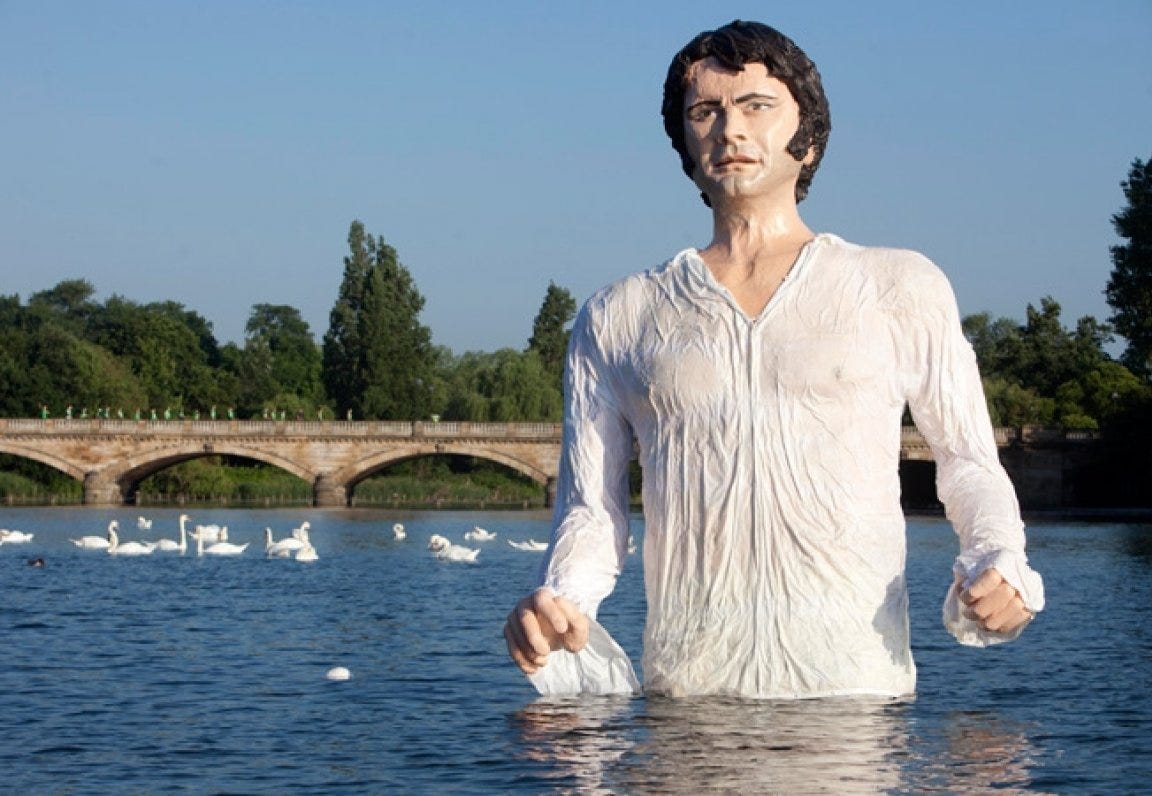Welcome back to The Experiment, a newsletter about making our way through the Uncertain Now. If you’re new here, welcome to the party. Make sure to subscribe so you don’t miss out on any of the fun.
This week Jack Hughes revisits the BBC adaptation of Pride & Prejudice on the 25th anniversary of the seminal adaptation and asks whether it’s better than the book in “Firth & Firthiness,” and Robin Whetstone mistakes an insult from her ex-boyfriend as a compliment in “Without a Bike,” the latest installment of Red Ticket, her Moscow memoir.
And as always, we remember who we’ve lost and offer recommendations on what to do, read, watch, and listen to, such as a bunch of great articles to read, a surprising Walker Lukens cover of a Willie Nelson song, and the latest single from a poptimist math rock band called Everything Everything that sounds like a bunch of my favorite bands mixed together. Oh, also I interviewed Evan Smith and wrote about it.
But first, does it seem like something has gone wrong with time?

Lately, time makes about as much sense as I’m Thinking of Ending Things, Charlie Kaufman’s latest head scratcher of a movie. The film, accurately but incompletely described as a psychological thriller, is a little like living through the Uncertain Now, where every day is Blursday, Marchtober 73rd. We turn to art to make sense of our world, but museums are only just now re-opening. Concerts have gotten postponed, optimistically, to 2021 while music venues close for good. Music comes to us in bytes now, through wireless ear buds, closing us off from connection to anyone around.
Only movies bring everyone together, though that really applies only to those we feel safe with sitting next to on the couch. You won’t kill me, darling, probably. Won’t you watch this movie with me?
The latest crop of movies makes me wonder if Hollywood knew we’d be unable to see straight in 2020. We’ve been waiting for Election Day since that morning we woke up with dread in November 2016, starting to piece together the car crash that was about to happen. If he’s the man we saw with our own eyes, the candidate who ignores the guardrails, then how far into the ravine will he launch the ship of state? What can happen to us? We tested the hypothesis and divined the First Law of the Trump Presidency: It’s not that things can always get worse but that they inevitably will.
Panic set in, and Republicans went mad, unable to disagree with the President on the time of day when he stopped all the clocks. We would read the words that came out of the President’s mouth and read it again, reasoning that the words could not possibly exist in that order or intend their literal meaning. We counted the days to November 2020, but the closer we got the further it seemed. On March 11, we were transported in a matter of hours from March Madness to 1918, followed a couple weeks later by 1929. Time cohered for a moment in late March and April. We all agreed to sit inside and let the pandemic pass, but then things were going so well a few governors decided to make it worse, and we found ourselves back in 1918 until some guys killed a man for jogging, and George Floyd couldn’t breathe, and suddenly it was 1968 everywhere.
We counted the days to November 2020, but the closer we got the further it seemed. On March 11, we were transported in a matter of hours from March Madness to 1918, followed a couple weeks later by 1929.
Then the future showed up early, yanking us out of the past and hurtling us into a dystopia that we had been assured was years off. A land mass the size of New Jersey burned on the Pacific coastline. Scientists gently speculated that our planet could be in death spiral as Ruth Bader Ginsberg’s death plunged us back into 1973.
The panic did not abate. Anxiety became the country’s background noise, providing a constant thrum like an industrial A/C unit. Life became a series of coping mechanisms. We got up every day and went nowhere to work and school, watched football games, and made sport of a preacher’s marital sex scandal. They discovered life on Venus, and everyone made fart jokes. A string quartet played while the Titanic sank. We settled for Tiger King.
Perhaps we should not be surprised that movies anticipated that the space-time continuum would tie us up in knots. Bill & Ted returned to show us a future in which reality folds in on itself and Holland Taylor portrays imperfection (the very thought!) in Bill & Ted Face the Music, while Christopher Nolan stomped his feet long enough to force movie houses to show Tenet, in which Denzel Washington’s son plays a character wrestling with the past to change the future.
But if those movies used time bending as a narrative structure, I’m Thinking of Ending Things used it as its animating force, informing every character and line of dialogue until no one was sure what was going on or if they could believe a single thing they were seeing.
One of my favorite pieces of advice I ever got from an addict was that you can’t judge your insides by another person’s outsides, but we’ve been projecting our innermost night terrors since Election Day 2016.
This, safe to say, frustrated comic and podcast Marc Maron not a little bit, and when he had Toni Collette on his podcast he asked her if it were challenging to play a character unmoored in time and reality. There is a long tracking shot, for example, when her character appears in different stages of her life, first middle aged, then old.
“You can’t think of the enormity of it. You can’t play the context of it,” explained Collette. “We were literally just playing the moment of it, which is what you have to do in any film playing any character.”
She tried, gamely, to explain why the story didn’t need to make sense for her, and that she didn’t “think of things in terms of genre anymore.” There was just a person, living a moment. That was her job, to be that person in that moment. “I always just think about the truth of the moment. That’s all I have control over, and sometimes I don’t even have control over that, and those are the best moments, actually.”
“When you have no control over the truth of the moment?” asked Maron.
“Yep.”
“But you are in it.”
“Yeah. So exciting. You just have to let go. So great. It’s like a metaphor for life’”
They returned to hashing over how they made the farm house scenes of I’m Thinking Of Ending Things. Maron pressed for clarity, clearly discomfited by the film’s non-lineal timeline that messed with the audience’s sense of reality. “Are we the old janitor, lonely in our pain?”
One of my favorite pieces of advice I ever got from a drug addict was that you can’t judge your insides by another person’s outsides, but we’ve been broadcasting our innermost night terrors since Election Day 2016. The Discourse is all inner monologues talking over each other. We doomscroll informed fear by day and project insults onto the Trump Tower by night.
The animating assumption of 2016 was that he could not possibly win, a presupposition that, along with pervasive sexism, drove the pundit class and the news media to hold Hillary Clinton to a higher standard and to allow the bellowing dotard to provide live entertainment. When you’re a celebrity, they just let you do it. She was a climber of suspicious motives, so they made her pass through fire. And she burned. We looked at Nate Silver’s 97% sure thing projection and did not see the Three Mile Island electoral meltdown happening all around us: The Clinton campaign took the Rust Belt for granted, and its commercials depicting Trump as a boor only increased his turnout. Russia, in trying to sow chaos, found a willing partner in the Trump campaign. Everything had to go wrong for Trump to win. It did.
Trump’s been LARPing Richard Nixon set in the Amerikanischer Volksstaat. Transcripts of his press conferences spool out on a Möbius strip as his presidency becomes a temporal distortion.
The animating assumption of the 2020 campaign is that everything left to lose is at risk on Election Day, and we look to the polls to tell us how this movie will end. Just tell me it’s going to be OK, we say when we look at FiveThirtyEight’s latest projections and probabilities, unable to find the signal over the constant thrum of fear.
“I’m not even sure what the story is,” said Maron, who listed elements of the story before he got to what about Kaufman’s movies irritated him. “There is a time issue, and I know that time is not really that important to him, and that time is sort of nebulous and fluid and doesn’t necessarily mean years, and I get that. I’m still not sure, is this in a head, is this not in a head…”
At which point Collette offered to tell him the secret of the story, but off mic, so we couldn’t hear.
Lately, Trump’s been LARPing Richard Nixon, set in the Amerikanischer Volksstaat. Transcripts of his press conferences spool out on a Möbius strip as his presidency becomes a temporal distortion. He claims he “up-played” the coronavirus, asking Americans not to believe what he said to Bob Woodward. He points to the present reality of burning cities and civil unrest, mass unemployment, and a mounting death toll as evidence of what could happen under a Biden administration.
“Well, I do wear them when I have to and when I’m in hospitals and other locations,” Trump told Anderson Cooper in a town hall. “But I will say this. They said at the Democrat convention they’re going to do a national mandate. They never did it, because they’ve checked out and they didn’t do it. And a good question is, you ask why Joe Biden ― they said we’re going to do a national mandate on masks.”
You read the words that come out of the President’s mouth and doubt your eyes.
"I don't know, to be honest, whether he's got it straight in his head what is real and what is unreal," Woodward told Cooper.
When Collette revealed that she’d shaved her head five times, Maron answered that he’d done it once and found walking around New York with a shaved head made him question his own identity.
“I was just like, who am I? What did I do? You know, what am I made of now?”
“I’m a blank canvas. Where do I go from here,” suggested Collette.
“Exactly,” said Maron. “Terrible feeling. Have you had that feeling before?”
“I love that feeling,” she said.
“You do?”
“Yes,” she said, stretching it out in her Australian accent. “Anything can happen from there.”
“But why do you assume it’s going to be good?” he asked.
“Well, why wouldn’t you?”
We are living through a tragicomedy, and the only wisdom we can get from art comes from Bill & Ted Face the Music, in which Rufus, played by a hologram of the late George Carlin, appears from two graves, the actor’s and the character’s, the latter set in fictitious world where reality is folding into itself. “The story doesn’t make sense until the end,” he reminds Bill and Ted.
Shortly after the pandemic set in, I called my friend Jo Carol, who was frightened. “I want to go somewhere to get away from it,” she said, “but there’s nowhere to go. It’s like climate change.”
And we’re stuck here in a time loop with an orange-haired leviathan who keeps telling us this is a hoax, it’ll go away on its own, and that we’re imagining the lights are getting dimmer.
“By the way, a lot of people don’t want to wear masks,” Trump told Cooper. “A lot of people think that masks are not good.”
Cooper asked who those people were. “Waiters,” said the president.
A day later, the director of the Center for Disease Control contradicted the food service workers and told Congress that masks might be a more effective countermeasure to the coronavirus than a vaccine. The President, forced to choose between the guy in charge of controlling diseases during a pandemic and some dude who brought him a well-done steak, insisted upon surreality.
“As far as the mask is concerned, he made a mistake,” said Trump.
There are four lights, and they are dimming. We know the First Law of the Trump Presidency, but that conflicts with the underlying truth of the coronavirus pandemic: We are all in this together. We know what happens when they restart college football; teams get infected. We know what happens when they reopen schools; curves go back up. The virus doesn’t care what politicians say but what they do, and we still believe in cause and effect. We like to joke about the surreality we share, but we know what happens when everybody doesn’t wear a mask during a pandemic with an airborne virus.
If the pandemic showed us we are all in this together now, Ginsberg’s passing has firmly rooted us in exactly when “now” is. This is the part of the story where we recognize each other in the maelstrom and do the next right thing. It’s us now. Godot ain’t coming, and Toni Collette’s right. We have to let go of trying to understand everything when nothing makes sense, and we cannot catastrophize the future before we’ve had a chance to write it. We might not know what day it is, but we can be damn sure we’re living through history. What we do now matters. We have to focus on what we can have control over.
“But at this place, at this moment of time, all mankind is us, whether we like it or not,” says Vladimir in Samuel Beckett’s play. “Let us make the most of it, before it is too late! Let us represent worthily for one the foul brood to which a cruel fate consigned us! What do you say?”
It’s time to go vote.
Firth & Firthiness
by Jack Hughes

The BBC adaptation of Pride & Prejudice was released 25 years ago this month. Jack Hughes, our pop culture historian, asks whether it’s better than the book.
There are two things about the ‘lake scene’ which strike me as remarkable. First, Firth isn’t exactly crazy about it. … Second, it’s not in the book. The scene for which Pride & Prejudice is now best known isn’t from Pride & Prejudice.
Red Ticket: Without a Bike
by Robin Whetstone

In the latest installment of her Moscow memoir, Robin finally runs into Lyosha. At first, she thinks it goes well.
“You are Hell’s Angel without bike,” he said.
I was delighted. This confirmed everything about me that I hoped was true. “Aw, Lyosha,” I said.
“I do not mean this as compliment,” he said gently.
RIP
Van Morrison’s reputation


How we’re getting through it
Nope. Not this.
Making marinara.
Unleashing slug-eating ducks
Seeing “Oma’s Kitchen Floor, 2008”
Attending a virtual photography exhibit
Ordering 42 Million to One by Hal Malchow
Preordering Red Headed Strangers by Walker Lukens
Listening to Brian Koppelman’s interview with Suzanne Vega
Preordering Lives of the Stoics: The Art of Living from Zeno to Marcus Aurelius
What I’m reading
Jonathan Chait: “Lock Him Up? For the Republic to survive Trump’s presidency, he must be tried for his crimes. Even if that sparks a constitutional crisis of its own.”
A world where the power of the state can be brought to bear against a person who was once its most famous symbol of wealth is one where every American will more easily imagine a future in which we are all truly equal before the law.
The Creative Factor: “The ‘Never Normal’ Era Has Begun”
Daniel Drezner: “I never considered voting for Trump in 2016. I may be scared into voting for him this year because of my exaggerated fears.”
Nor do Biden’s national security positions reassure me. He would enact a reprise of Obama administration policies, and all we got from those eight years was a slow, steady recovery from the Great Recession with restored power and prestige. No one needs to revisit that dark era ever again.
Jason Gay: “September Feels Like March, and It’s Very, Very Sad”
Russell Gold: “Why Did Covid Overwhelm Hospitals? A Yearslong Drive for Efficiency”
The upshot is fewer hospitals, with less capacity for intensive services. There has been a 12% decrease in the number of hospitals between 1975 and 2018, American Hospital Association data show—even as the U.S. population has grown about 50%.
Jim Harrison: “Another Country”
Dave Itzkoff: “Chris Rock Tried to Warn Us”
Shane Littrell, Evan F. Risko, & Jonathan A. Fugelsang: “‘You can’t bullshit a bullshitter’ (or can you?): Bullshitting frequency predicts receptivity to various types of bullshit”
Alexandra Petri: “I can’t believe you’re forcing me to vote for Trump, which I definitely didn’t already want to do”
I am more afraid that Joe Biden is the unwitting puppet of dangerous socialists, something you forced me to think using a mind ray. God! You’re even more disgusting than I imagined.
Alyssa Rosenberg: “The summer Black culture pushed back”
Science Advances: “Political storms: Emergent partisan skepticism of hurricane risks”
Likely Trump-voting Florida residents were 10 to 11 percentage points less likely to evacuate Hurricane Irma than Clinton voters (34% versus 45%), a gap not present in prior hurricanes. … The rapid surge in media-led suspicion of hurricane forecasts—and the resulting divide in self-protective measures—illustrates a large behavioral consequence of science denialism.
Scientific American: “Scientific American Endorses Joe Biden: We’ve never backed a presidential candidate in our 175-year history—until now”
Frank Sinatra’s letter to George Michael
David Von Drehle: “The lessons two ancient philosophers have for us during the pandemic”
Gene Weingarten: “A neighbor asked for a tomato. This is where the story gets weird.”
Dan Zak: “The presidency has been swamped by the Trump Aesthetic”
Americans have been familiar with his personal aesthetic for decades: the gold, the braggadocio, the huckster superlatives, the reality-TV staging, the all-encompassing obsession with his surname. But for nearly four years, the Trump Aesthetic has clashed (or fused?) with the U.S. presidency, each marking the other with a stamp that won’t soon fade.
Who I’m Talking To
I host a talk show at work called Lunch With Smart People, and on the most recent episode I got to talk to Evan Smith, CEO of the Texas Tribune and host of PBS’s long-running Overheard with Evan Smith. He had some interesting things to say about the do’s and don’ts of being a digital native.


What I’m watching
Yes, John Leguizamo’s chess movie Critical Thinking is so obviously intentionally uplifting that it could qualify as a one-way elevator, but tell me you don’t need to see a story of POC triumph without a white savior. Go ahead.
Liar.
What I’m listening to
Walker Lukens’ take on “Always On My Mind” is cool as heck. Preorder his upcoming album of Willie Nelson songs here.
Speaking of covers, imagine covering your hero’s biggest hit — and pulling it off! Here’s Suzanne Vega’s cover of Lou Reed’s “Take a Walk on the Wild Side.”
How did I never hear Everything Everything before? Perhaps because they’ve never had a Top 10 hit anywhere in the world and have charted more singles in Mexico (dos) than in the United States (zero). They sound like a combination of some of my favorite bands: Talking Heads, Radiohead, TV on the Radio. They’re a poptimist, math rock band from the UK that one critic wrote was "Timbaland if he cocked an oblique ear to Yes." Well, OK. Welcome to my new obsession.
What do you think of today's email? I'd love to hear your thoughts, questions and feedback. I might even put ‘em in the newsletter if I don’t steal it outright.
Enjoying this newsletter? Forward to a friend! They can sign up here. Unless of course you were forwarded this email, in which case you should…
The latest Real Clear Politics polling average has Trump’s lead in Texas at 3.5%. Texas is a swing state. Let’s act like it.
Want a way to send gifts and support local restaurants? Goldbelly’s got you hooked up. Sending friends kolaches has become my new favorite thing.
I used this to order scotch delivered right to my door. Recommend.
Thanks to Noom I am down to my college weight, and haven’t had to cut out any foods. I hit my goal weight before Memorial Day and have stayed within a few pounds either way ever since. This is easy. Noom is an app that uses psychology, calorie counting, and measuring activity to change your behavior and the way you think about food. I’m stronger and healthier than I’ve been in years. Click on the blue box to get 20% off. Seriously, this works.
Headspace is a meditation app. I’ve used it for a couple years and am absolutely shocked at how much it’s taught me about managing my inner life. Try it free for a couple weeks. Don’t worry if you’ve never done it before. They talk you through it.
Want a way to send gifts and support local restaurants? Goldbelly’s got you hooked up.
I now offer personal career coaching sessions through Need Hop.
The extent of my political work this election cycle is as the treasurer to a Super PAC with one mission: helping Joe Biden win Texas. If you want to help, here’s how:
If this newsletter is of some value to you, consider donating. Honestly, I’m not doing this for the money. I’m writing this newsletter for myself, and for you. And a lot of you are contributing with letters and by suggesting articles for me to post. But some of you have asked for a way to donate money, so I’m posting my Venmo and PayPal information here. I promise to waste every cent you give me on having fun, because writing this newsletter for you is some of the most fun I’ve had. Venmo me at @Jason-Stanford-1, or use this PayPal link.



